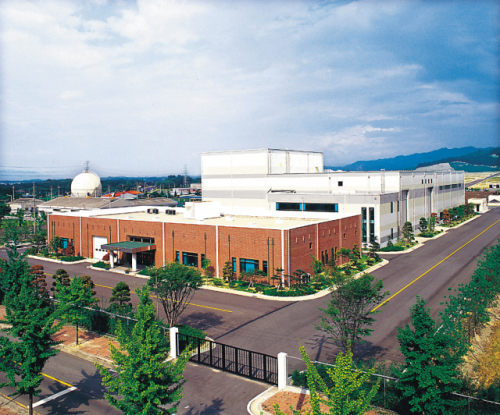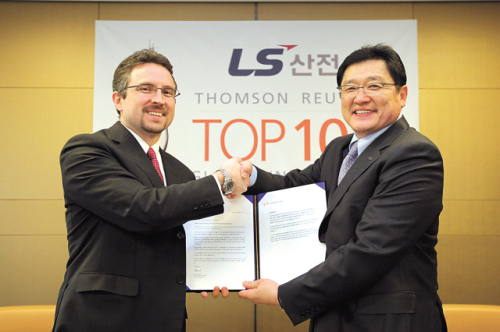
Electric equipment maker expands R&D spending, ventures into green technologies
From electronics to steel to shipbuilding, Korean companies have been ramping up efforts in crafting innovative products and spearheading new technologies to stay ahead of ever-fierce competition at home and abroad.
With a surging number of homegrown firms going global, they are striving to diversify business portfolios and customer bases to reinforce revenue streams in the face of economic uncertainties stemming from Europe.
At the vanguard of the industry-wide crusade is LS Industrial Systems, Korea’s top maker of electrical components.
Founded in 1974, the Anyang, Gyeonggi Province-based company lately set innovation as its slogan and top priority under its 2015 growth vision.
Harnessing its top-notch technologies in electrical equipment and automation, LSIS has been venturing into 11 green industries since 2008 with a focus on smart grids. Other sectors include solar power, inverters, energy-saving electrical apparatus and radio frequency identification.
The company transfers at least 5 percent of its sales every year to research and development, which shot up to 80.3 billion won ($71.3 million) last year from 39 billion won in 2006.
From electronics to steel to shipbuilding, Korean companies have been ramping up efforts in crafting innovative products and spearheading new technologies to stay ahead of ever-fierce competition at home and abroad.
With a surging number of homegrown firms going global, they are striving to diversify business portfolios and customer bases to reinforce revenue streams in the face of economic uncertainties stemming from Europe.
At the vanguard of the industry-wide crusade is LS Industrial Systems, Korea’s top maker of electrical components.
Founded in 1974, the Anyang, Gyeonggi Province-based company lately set innovation as its slogan and top priority under its 2015 growth vision.
Harnessing its top-notch technologies in electrical equipment and automation, LSIS has been venturing into 11 green industries since 2008 with a focus on smart grids. Other sectors include solar power, inverters, energy-saving electrical apparatus and radio frequency identification.
The company transfers at least 5 percent of its sales every year to research and development, which shot up to 80.3 billion won ($71.3 million) last year from 39 billion won in 2006.

LSIS’ stocks, however, has shed more than 35 percent since its peak of 104,500 won on Oct. 1, 2009 as its revenues stagnated at around 14 trillion won since then.
“We made bold investments in smart meters in their very infancy even though we knew there’s no way we could earn profits out of it for a while,” an LSIS spokesperson said.
“We did it because we acknowledged the significance of the electrical meters as the first step toward smart grids, and then obtained a patent for the technology in 2010.”
The number of its patents shot up 56 percent in Korea and 183 percent overseas between 2009 and 2011, company officials said. But they refused to release the exact numbers due to confidentiality agreements with certifiers.
The firm’s innovation drive paid off somewhat in December when Thomson Reuters, a multinational financial news and information provider, picked it as one of the world’s 100 most innovative companies for 2011.
LSIS was one of the four Korean firms that made it to the list, alongside Samsung Electronics, LG Electronics and Cheil Industries.
“(The award) confirms an organization’s commitment to progressing innovation globally, to the protection of ideas and to the commercialization of inventions,” Thomson Reuters said in its report.
The New York-headquartered firm launched the list last year based on four criteria ― patent approval success rate, global reach of patent portfolio, patent influence in literature citations and overall patent volume.
Its methodology entails analyzing patent data and related metrics to detect innovators in the international business community, the company said.
Of the 100 companies, 40 were based in the U.S., 31 were in Asia with 27 in Japan, and 29 were from Europe. Among them are Apple, 3M, General Electric, Bayer, Boeing, L’Oral and Hitachi.
Industry data shows that the 100 created more than 400,000 new jobs last year, up 3 percent from a year earlier. Their average growth rate also topped the average of the S&P 500 companies during the same period.
“Innovation is a means of growth and prosperity for companies and nations seeking to overcome sluggish economies and achieve competitive advantage,” said David Brown, president of Thomson Reuters’ intellectual property solutions unit, in a press release.
The award came on the heels of a heated debate engulfing Corporate Korea in recent years over its capability to lead an increasingly kaleidoscopic technology battle rather than remain a copycat.
While powerhouses like Samsung, LG and Hyundai Motor enjoy their ever-expanding clout across continents, critics pointed to their fundamental lack of innovation and creativity that give birth to products that customers would scramble for but never existed.
With the mainstay of Asia’s fourth-largest economy shifting toward high-tech sectors, companies have been placing big bets on research and development to grow beyond a “fast follower.”
Seeking to shepherd the pack, LSIS said it injected more than 50 billion won to set up Korea’s first private electrical testing and technology center with a capacity of 1,600 megavolt ampere in 2000 in Cheongju, North Chungcheong Province.
Researchers at the accredited facility demonstrate various power supply gears, explore new technologies and conduct localization programs with state-of-the-art equipment, it added.
The company aims to branch out into areas like sub-assemblies for electric cars, power semiconductor modules, fuel cells, liquid crystal display and energy-saving buildings this year and boost them to more than 30 percent of its entire operations by 2015.
“Despite a recent slump in electrical equipment and automation sectors, as well as losses in new business fields, LSIS will show a robust performance this year as demand springs back for electricity grids and the base effects come into play,” said Paul Hah, an analyst at Woori Investment & Securities.
Another booster is LS Metal, which was spun off from LSIS’ metal operations in 2010. LSIS owns a 100-percent stake in the Seoul-based manufacturer of copper and stainless tubes and pipes.
Brisk development of shale gas and liquefied natural gas around the world will push up demand for LS Metal’s inner grooved tubes, a key ingredient for ships, liquefaction plant and other related facilities, according to Kiwoom Securities.
“LSIS is a hidden beneficiary of the ongoing shale gas and LNG boom, which will push up demand for LS Metal’s flagship inner grooved tubes,” said the brokerage’s analyst Kim Ji-san, recommending investment in LSIS.
Sales of LS Metal’s large inner grooved tubes spiked 388 percent to 97 billion won in 2011 from a year before. That could further jump to 140 billion won this year with operating profit touching 15 billion won, Kim forecasts.
LSIS said in January it aims to more than triple its revenues 4.5 trillion won and sextuple its profit to 700 billion won by 2015. The targets reflect a roughly 320 percent rise in sales and a 630 percent surge in profit from last year.
By Shin Hyon-hee
(heeshin@heraldcorp.com)











![[Hello India] Hyundai Motor vows to boost 'clean mobility' in India](http://res.heraldm.com/phpwas/restmb_idxmake.php?idx=644&simg=/content/image/2024/04/25/20240425050672_0.jpg&u=)







